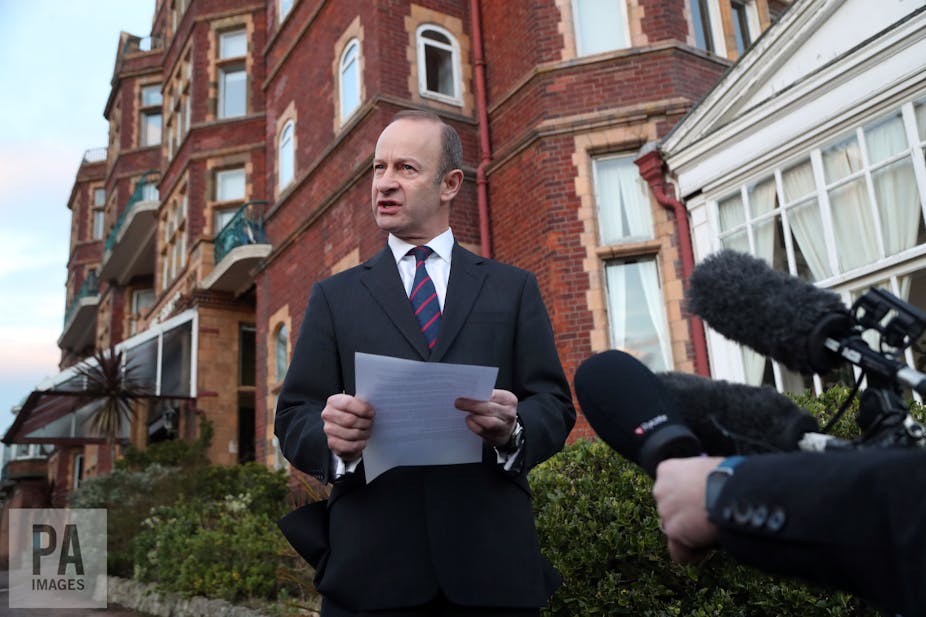One of the big arguments for bringing outsiders into politics is that they can bring insights from their previous roles. The current leader of the UK Independence Party (UKIP), Henry Bolton, might possibly be musing on this right now, given his extensive experience in the British Army, navigating hostile environments and promoting post-conflict stabilisation.
Bolton’s current woes have been long in the making. Elected in September 2017 with only 30% of the vote, his success was in part due to being neither the far-right Anne Marie Waters nor one of the longer-standing figures in the party hierarchy: he was the centrist choice to move beyond the Nigel Farage era.
That disconnect is now proving to be his undoing, as opponents line up to quit their party posts and to press him to resign because of his relationship with former girlfriend Jo Marney, who it was reported sent offensive racist text messages. His resilience under fire, and refusal to resign, means that it will now be up to an emergency general meeting of the membership to decide his future.
But what does the future hold for UKIP in general? Here are three possible paths.
You complete me
In times of such existential distress, there is an obvious temptation for the party to return to its glory days, and to the one man who seemed to be able to make it all hold together: Farage.
Farage’s looming presence was only deepened by Bolton’s choice to speak exclusively to Farage about the situation, on the latter’s LBC radio show on January 22. That Farage gave his approval to Bolton’s decision to go to the membership will have done no harm, even if the support was rather equivocal.
In the history of the party, Farage is the only leader to have successfully stayed in office over several electoral cycles, albeit by dint of a ruthless removal of anyone who might pose a threat to his position as UKIP’s figurehead. His return would signal the possibility of regaining their biggest media (and popular) asset, as well as the return of several key financial backers at a time when income is ever more of a problem.
Farage has form in this: he’s had two occasions when he’s been dragged back to the leader’s office, so why not a third?

But it is precisely this that makes it problematic: there are only so many times you can play the returning hero card, especially if the coterie you have built up has since dispersed. As much as Farage signals the good times, he also presents the past and a rehashing of old battles. In short, he wouldn’t answer the fundamental question of what does the party do now.
Boldly going
That suggests a second path, namely embracing the new reality and building a new populist movement. That was the pitch of Farage’s immediate successor, Paul Nuttall, who saw that UKIP could move into old Labour heartlands to represent the dispossessed and disaffected, speaking for them on a range of issues, not just Europe or immigration.
Nuttall’s project was grounded in an understanding of what had changed, but the snap general election in June 2017 called time on him before he could really embed that within the party structures. Since then, the party has essentially trodden water.
Which leaves an opening for a new leader to pick up the reins and sell a vision of a new UKIP, fighting for all those who feel that Westminster doesn’t care about them and that Brexit Britain is precisely the time and place to break free of the shackles of the same old politicians and elites.
In this reading, Farage is just the wrong person; a man with too much baggage. Sadly – for the party – who is right is a much more difficult challenge. One of the more striking features of UKIP’s machinations since June 2016 has been the lack of a new face, a strong figure to unite and lead. Unless one appears, this project will remain little more than a glint in the eye.
Ashes to ashes
All of which takes us to the future that many commentators see: a collapse into irrelevance. Even Farage himself pronounced that the party could have disappeared within 18 months if things continue to be badly handled.
Not only is there the issue of what the party stands for, but other threats lurk. Its finances are in a poor state and set to worsen further once the income from the party’s MEPs in the European Parliament comes to an end in March 2019.
Reports continue that Farage could form a new movement, with his backer Arron Banks, which would be an obvious competitor to UKIP. At the same time, Jeremy Corbyn’s Labour continues to win back supporters who had defected to UKIP with its rhetorical radicalism.
In stark terms, perhaps the party’s time has come now it has achieved its hardline goal of getting the UK out of the EU.
And yet, the party’s history is both long and littered with internal rifts, fights, court cases and changing of locks at the central office. UKIP has never really settled – even Farage’s time saw many tensions, pushed down rather than resolved – and it has persisted.
Over the past decades the party has built a community and a constituency. For all its troubles, it still polled over a million votes in the 2017 election: not bad for a party apparently with no point.
The path for UKIP is going to be difficult, whatever it decides to do, but it would be wrong to assume that it will not try its hardest to get there.

